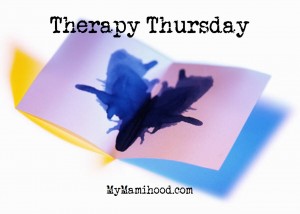Therapy Thursday: Lost In Grief
 Last week I saw something that caught my attention on my FB timeline. It was a post from Ty Alexander of Gorgeous In Grey speaking about the passing of her friend Karyn Washington. My heart ached in a way I cannot describe. Karyn lost her mom after a battle with cancer. It got me thinking and I hope to have more details about some projects I'm working on as I have struggled with depression and specifically have dealt with the type of mother-grief that consumes your heart and soul.
Last week I saw something that caught my attention on my FB timeline. It was a post from Ty Alexander of Gorgeous In Grey speaking about the passing of her friend Karyn Washington. My heart ached in a way I cannot describe. Karyn lost her mom after a battle with cancer. It got me thinking and I hope to have more details about some projects I'm working on as I have struggled with depression and specifically have dealt with the type of mother-grief that consumes your heart and soul.
In the meantime, I thought it would be a good time to introduce you to Cheryl Donald, a licensed psychotherapist and new resident 'hood therapist. Here are her thoughts on the subject.

Lost In Grief
Karyn Washington, creator of popular website “For Brown Girls†committed suicide last week at the age 22. “For Brown Girls†is a website known for its efforts to empower by celebrating the beauty of African-American women, particularly those of dark-complexion. Having grown comfortable in her own skin at a young age, Washington was an inspiration to women of all colors and hues as they began to recognize and embrace their own beauty. While all reports indicate that Washington had a strong sense of self, was clearly ambitious, and had a strong social network, she was dealing with a very personal battle familiar to many of us: managing loss and grief.
In our quest to understand what drives people to commit to suicide, we must first take a look at the struggles that led up to the tragedy. Reports indicate that Washington’s mother had recently passed away after a long painful battle with cancer; the loss became increasingly difficult to manage and grief consumed this young woman. To understand how loss can turn into all-consuming grief, we must first differentiate the two.
Loss vs Grief Loss is often associated with death. But loss can also include illness, the loss of a job, divorce or positive changes such as a promotion, a move, or marriage. Grief is the emotional process we experience as a result of the loss. There are five stages of grief widely acknowledged by mental health practitioners that were first proposed by Elisabeth Kübler-Ross in her 1969 book “On Death and Dyingâ€, they are as follows:
- Denial and Isolation: our first instinct is to deny the reality of our loss. We block out the words and hide from the facts as a defense mechanism to buffer our immediate shock. It is a temporary response that helps us get through the first wave of pain.
- Anger: as denial and isolation becomes increasingly difficult to maintain, the reality and pain of the situation re-emerges. We begin to express our pain as anger; an emotion that makes us feels less vulnerable. The anger is often directed toward our lost loved one, which in turn makes us feel guilty and thus makes us even angrier with those still around us.
- Bargaining: this is a vain expression of hope that the bad news we have received is reversible; we begin seeking ways to avoid having to accept the bad thing that has happened in our life.
- Depression: there are two types of depression associated with mourning. The first one is a reaction to the implications relating to the loss (i.e. sadness, loneliness, regret). Â The second type of depression is more subtle and private and involves our quiet preparation to separate and to bid our loved one farewell.
- Acceptance: This stage is marked by withdrawal and calm. It is not a period of depression, but one focused on a return of stability to our life. We are ready and actively involved in moving on to the next phase of their lives.
The grief stages listed above are commonly experienced by people suffering from loss. The five stages can occur in any order and each stage can vary in intensity and longevity. Therefore, there should be no shame or stigma associated with the expression of these commonly accepted human emotions.
Society often does not afford us the time needed to move through each stage organically and thus some never reach the acceptance stage of mourning and may never move beyond their denial or anger.  If you find yourself “stuck†in a grief stage, counseling and psychotherapy can play an integral in helping you process the pain and continue moving forward in the grieving process.

